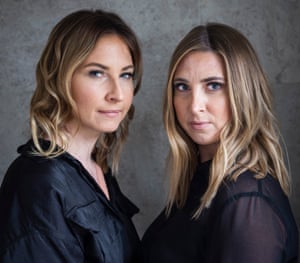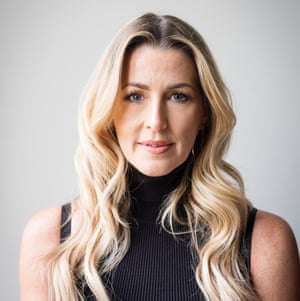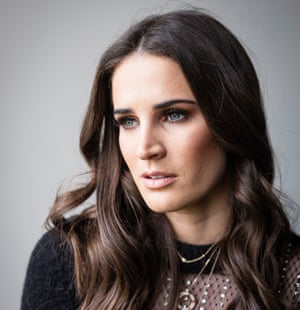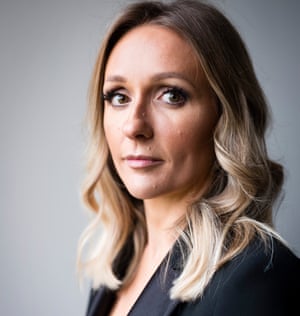'We took inspiration from Mumsnet': the footballers’ wives' support network

“Welcome to Cheshire,” says the taxi driver, pulling out of Wilmslow station, “home of millionaire housewives and footballers.” As we drive, we pass designer boutiques, mock Tudor houses, and shiny sports cars. In Cheshire’s golden triangle it is easy to buy into the stereotype of the footballer’s wife.
And on the surface, at least, the image rings true. Leanne Brown, formerly of the reality TV show The Real Housewives Of Cheshire and wife of former Manchester United defender Wes Brown, lives in an 11,000 sq ft mansion, complete with swimming pool, grand piano and the heady scent of Jo Malone candles.
On a freezing cold morning in January, a group of women gathers at her house. One by one they buzz the security gate: Amara Kanu, wife of former Arsenal striker Nwankwo Kanu and a wellness coach; Rachel Peters, fiance of former Tottenham midfielder Ryan Mason and seven months pregnant with their second child; Jennifer Lonergan, wife of Middlesbrough goalkeeper Andrew Lonergan and owner of a luxury travel company; and Erin Borini, married to AC Milan striker Fabio Borini and a model. The women congregate in the kitchen ahead of Guardian Weekend’s photoshoot, doing their hair and makeup, a glamorous scene of stilettos, personalized luggage and ringlit selfies. The women want to talk about the challenges they and their partners have faced, both during and after high-profile football careers, but they choose their words cautiously. “We don’t want this to be a pity piece,” says Leanne, as they each stress how lucky they are to have enjoyed the benefits that come with a life in football. “It’s about raising awareness for other wives and families in the industry,” she adds.
Helen Drury, wife of former Norwich City captain Adam Drury, and Maggie Devine-Inman, wife of former Peterborough United midfielder Niall Inman, have encouraged the women to talk to me after setting up lifestyle Club, an online hub launched in 2015 connecting 400 wives and partners of footballers. While the players themselves can go to the Professional Footballers’ Association (PFA), there is minimal support for their families. “We took inspiration from Mumsnet,” explains Helen. “We wanted a source of advice for women – whether that’s where to live in a new town, or how to get help if your husband has a gambling problem.”
Helen and Maggie met through their husbands – best friends since their football apprenticeship days at Peterborough – and are refreshingly down to earth. “I’m not great at the glamour part,” laughs Maggie. “I’ve usually got wet hair when we get in the car to go to meetings, but it dries on the way.” But the pair’s passion for their cause has won them the trust of this largely private community. “As wives in football, we’ve shared experiences that even our closest friends and family wouldn’t understand,” says Maggie.
The average career of a professional footballer lasts just eight years, according to the PFA. Despite the riches earned in that time, a staggering 40% are declared bankrupt within five years of hanging up their boots, according to research from XPro, a charity set up by former Wimbledon striker Dean Holdsworth to support retired footballers. Poor financial advice is often the culprit. From the late 1990s, more than 130 footballers including Wayne Rooney and David Beckham invested in a number of now-notorious schemes to boost the British film industry. While some were later revealed to be fraudulent, HMRC is also clamping down on the legitimate ones, citing tax avoidance, and demanding payments over and above the original investments, sending many football families spiraling into debt. The former Premier League star Dean Windass has told how he lost his house and became suicidal when a tax bill for £164,000 landed.
Even without bad investments, retirement can be a shock. Within a year, 33% of footballers get divorced, according to XPro. “For 19 years my husband was told where to be when to go on holiday, what to eat and drink,” says Helen. “I would call it ‘institutionalized’. Then he retires and the phone stops ringing. The people who were around you disappear, and you’re alone.” Helen adds that Norwich City have been supportive, and the Drurys are grateful for their lives in football.
“Men are not good at talking,” adds Maggie. “We’ve had girls write to us about their husbands being depressed and not able to tell anyone.” This month sees the launch of their LifeStyled Club: The Podcast, with BT Sport presenter Jake Humphrey, in which they hope to open up taboo many conversations.
Delia Smith, Norwich’s majority shareholder, has been supportive, connecting the women with football’s governing bodies to pool resources and expertise. But the male-dominated industry has yet to truly back the idea. Footballers’ wives haven’t had the best press, and are usually subject to depressingly misogynistic tropes. “We have lived with the Wag stigma for so long,” says Leanne. “People were quick to brand me a ‘sponger’, just for being a stay-at-home mum.”
Leanne’s upbringing, in a small village in Cumbria, was tough. Her mother worked three jobs, and her father left the family home when Leanne was 13. In her teens, Leanne ended up in a violent relationship. Meeting Wes changed her life, she says. She was a table dancer when they met at a club in Manchester. He was 18, a young star breaking into the first team at Manchester United – not that she had any inkling. They caught each other’s eye. “After a few drinks I went over and kissed him,” she says, smiling. “I’d never done anything like that before. Afterward, I said, ‘Anyway, what’s your name?’” She laughs.
She had dreamed of being a glamour model, but Wes wasn’t so sure. Instead, Leanne went to college to study beauty therapy. At 26 she was pregnant with their first child, Halle, and became a stay-at-home mother. Leanne says she’s doing this interview now because she wants to help other women avoid the mistakes she made. “Female empowerment,” she says, firmly. “All too often, as wives, we are alienated from meetings and investments. People take advantage in every sense, charging you extortionate prices. You are manipulated into doing crap investments so others can make a few quid off the back of you.” The family have lost money on poor financial advice and are currently engaged in a legal dispute with a former friend, The Real Housewives Of Cheshire star Dawn Ward, after allegedly lending her £500,000. The Browns are selling up and downsizing to a smaller property.
Despite the challenges, the couple have been together 21 years. “Don’t get me wrong, we’ve had our tough times,” says Leanne, “but I love him to bits.” As we chat, Wes arrives home and helps their three daughters, Halle, 16, Lilia, 11, and Lola, 7, with their homework. “He’s always been a hands-on dad,” says their mother, proudly.
At 24, Rachel is the youngest of the group. She smiles a lot, but there is a seriousness about her, too. Her life changed dramatically when her fiance, Ryan, was injured in a collision on the pitch in 2017. The memories are still raw. When we meet at her home in Hertfordshire, she settles into a sofa and describes herself as “a geek, with my nose in a book” (her favourite novel is War And Peace). She studied business and economics at Lancaster University, and had little interest in finding a boyfriend. But in her third year she was introduced to Ryan – then a talented midfielder at Tottenham. They came from the same area, and hit it off. They eventually moved in together, relocating to Hull City in 2016 after the club bought Ryan for a record £13m. By the end of the year Ryan had proposed on a boat in Dubai.
Just a few weeks later, on 22 January 2017, Ryan suffered a life-threatening head injury at Stamford Bridge when Chelsea defender Gary Cahill rose to head the ball, missed, and smashed into the back of Ryan’s head, fracturing his skull. Within an hour the then 25-year-old was being operated on at St Mary’s hospital in London, his family waiting anxiously for news.
As Rachel recalls the day of the collision, tears fall thick and fast. “I’m sorry,” she says, “I’ve just never talked about it before. How can your life be so perfect and then suddenly your whole world is turned upside down? He was unresponsive. He actually died, and they brought him back. It’s crazy.”
Rachel was at home in Hull when a message came through on her phone. Ryan’s skull had been crushed by the force of the collision. He had a brain haemorrhage, a broken eye socket and a broken jaw. Fourteen metal plates were inserted into his head as the surgeons tried to piece him back together.
When Ryan came home he could not sit up or walk. The slightest noise was excruciating to him, and the cocktail of painkillers gave him nightmares. Without any home help, Rachel was left to nurse him. “His body was traumatised. His skin was peeling off his fingertips, he had to wear white cotton gloves.” She washed, fed, dressed him. How did she manage? “I wasn’t thinking of myself,” she says quietly.
After three months, Ryan began to walk. The couple credit Mark Waller, the Hull club doctor, with saving his life. Ryan’s former club, Tottenham, opened their doors for his rehabilitation; and Petr Cech, the Arsenal goalkeeper who suffered a head injury while playing for Chelsea in 2006, provided support. It was on Cech’s advice that Ryan learned to play the piano to help retrain the neurological pathways in his brain.
To have a playing career cut short, at 25, has been devastating for Ryan. Rachel wants eventually to go back to university to study architecture and design, but with a baby on the way, there are happy distractions. The front door goes: it’s Ryan with their 14-month-old son, George. “We haven’t let it change us,” she says of the accident. “We are positive people, and we are so in love.”
Across the county border in a small village in Essex, I meet Steph Etherington, wife of former West Ham winger Matthew Etherington, now running her own business making children’s clothes. With two young daughters, she has her hands full, and couldn’t make the journey to Cheshire to be photographed. Instead, we sit on the sofa in her modest home as she tells me how their lives were turned upside down by Matt’s gambling addiction when he lost £1.5m in 2009.
Steph is conscious of not wanting to upset Matt by raking over old wounds but feels it is important to warn other partners to look out for an addiction that blights young footballers. “Back then I didn’t even ask him about it. The best thing you can do is talk.” And if they won’t open up? Steph shakes her head. “If they won’t open up, then I don’t know. They need to want to get help.”
Football and gambling have long been linked. Former England striker Michael Owen confessed to losing up to £40,000 to the bookies, while even the PFA’s chief executive Gordon Taylor reportedly amassed debts of £100,000. Many former players describe a casual gambling culture within the game – card schools on the back of the team bus, team bonding over a bet.
Steph says she always knew Matt liked to gamble but didn’t recognize it as a problem at first. “I was only 20 when we met, I didn’t know anything about life back then.” Matt started gambling as a young player. Away from home, killing time in a hotel room with more money than he knew what to do with, he was introduced to the dog track by a friend. The habit spiraled when he moved to West Ham in 2003. The club tried to help by paying off his debts, but the problem was deeper than cash flow. “He’d got himself in a right old state,” Steph says, gently.
When Matt moved to Stoke in 2009, his family sat him down and forced him to confront the issue. He agreed to go to football’s rehabilitation clinic, Sporting Chance. “It was Peter Kay at the clinic who saved him,” says Steph. “I remember he called me into his office and asked if I was OK. He said, ‘I just want you to know that if you were to say to Matt that you’re leaving him, it wouldn’t make any difference. It doesn’t mean he doesn’t love you, it’s just not as easy as that.’ It was hard because there was nothing I could do.”
Steph is incredibly proud of how Matt has put his addiction behind him and forged a new life coaching the Under-18s at Peterborough. “He will always have to live with it. But he’s like a different person now. He did learn his lesson. He is the happiest ever. It’s just taken a few years to get there.”
As he left his gambling past behind, another challenge emerged: retirement. After playing his last game for Stoke in 2014, Matt was out of work for four years with a hefty tax bill of £60,000 following investments in film schemes. Without an income the couple were forced to sell their house. “We would never have got a seven-year mortgage if we’d been properly advised,” she says. “We just thought, ‘Pay it off as quickly as possible’. We didn’t imagine Matt would retire at 33. But we’ve got our happy ending now, haven’t we?” She smiles. “I love what Maggie and Helen are doing. It’s so good for the wives to have a place where they can speak about things. Girl power.”
Soon she was pregnant, but at home in Hertfordshire she felt isolated. “I didn’t go out like other women my age. My hormones were all over the place. It could have broken me, being so alone.” She credits Kolo Touré and Emmanuel Adebayor’s wives with helping her adjust to life in the UK; the couple have since had three children together. When, in 2014, Kanu traveled to the US for heart surgery, Amara spent an agonizing three months there nursing him back to health. She says she stayed sane by going to the gym, prompting her to start a business as a wellness coach.
After years as a stay-at-home mother, Jennifer Lonergan is also thrilled to be running her own business. Being able to contribute to the family finances was important to her, she says. In their 15 years of marriage, she and her husband Andrew have faced some extraordinary challenges – their eldest daughter, Millie, was born with phenylketonuria (PKU), a rare metabolic condition that can cause brain damage and requires close monitoring; they also lost Jennifer’s brother Anthony to suicide. But in football, there is rarely time off for a new baby, or compassionate leave; instead, players are expected to be straight back on to the pitch, even after life-changing events. Last year, Jennifer climbed Mount Kilimanjaro to highlight mental health issues, raising funds for Mind, and for the Willink unit at Manchester hospital which supports children with PKU. Millie – now 12 – manages her condition with a maturity beyond her years, she says, and together with her younger sister, Grace, is a talented footballer. “We’ve faced some tough times as a family, but I’m so proud of how we’ve managed to pull through,” says Jennifer. “It’s so important to talk to each other. I wanted to share my story to help other families do the same.”
Stepping outside Leanne’s house, the women gather for one final photograph. Thick fog descends as they pick their way through a muddy field. The air is freezing, the light fading. The women stay close together. There is an honesty, a rawness, about their friendship. “I wonder what the metaphor is?” asks Helen. Something like, in the fog, everyone needs a hand to hold.






